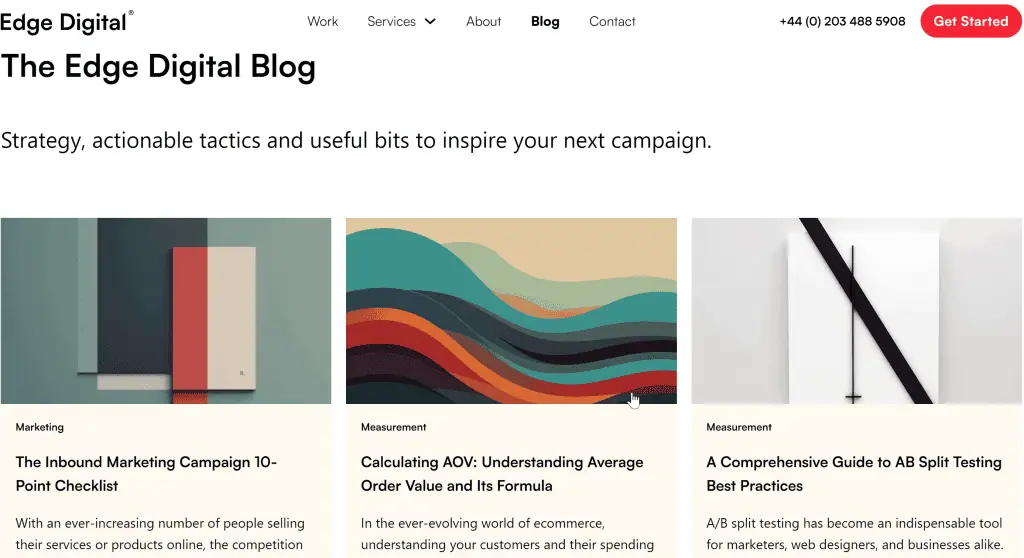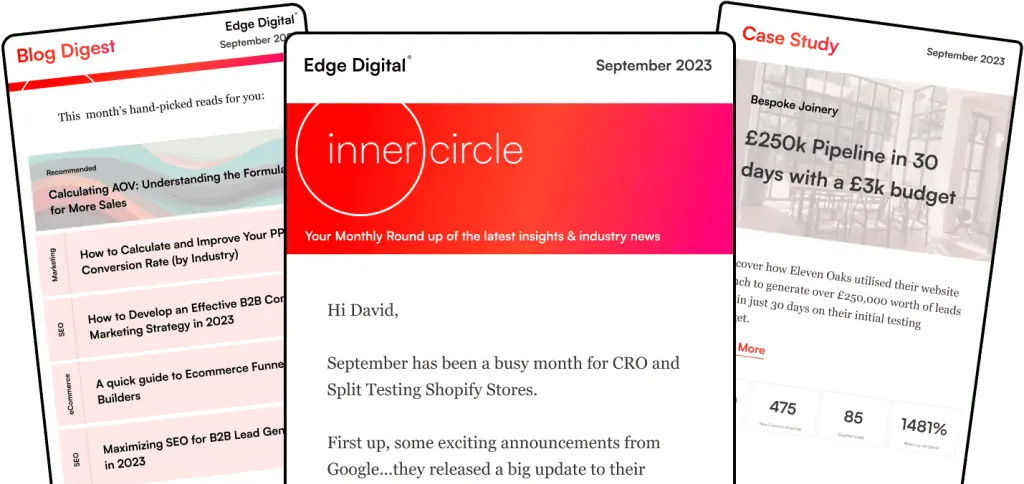Businesses are increasingly recognizing the power of a well-crafted B2B content marketing strategy. However, many still struggle to navigate the complex landscape of B2B marketing and unlock its full potential. This blog post aims to demystify B2B content marketing and equip you with practical knowledge and insights to develop an effective strategy that drives results.
An essential component of this strategy is developing an effective marketing campaign to measure the impact of your efforts and encourage previous customers to return.
Key Takeaways
Develop an effective B2B content marketing strategy by understanding the differences between B2B and B2C, setting SMART goals, creating engaging content ideas and choosing appropriate formats/channels.
Identify target audience & create buyer personas to tailor content for maximum engagement & lead conversion.
Leverage video marketing, influencer partnerships & personalized experiences in 2025 to remain competitive.

Understanding the Importance of B2B Content Marketing Strategy
A robust B2B content marketing strategy is the backbone of successful marketing efforts, attracting and engaging business prospects, generating leads, and ultimately driving sales. Implementing a content marketing strategy empowers you to target prospective customers directly, generate leads efficiently, and amplify the reach and revenue-generating potential of your content. Understanding why is content marketing crucial for B2B companies is essential; it educates and informs target audiences, showcases expertise, establishes authority, and delivers long-term value compared to other marketing methods.
Essential elements for a successful B2B content marketing strategy include conducting audience research, producing and distributing engaging content, and swiftly transferring leads to sales. Engaging business prospects, generating high-quality, value-added content that addresses buyers’ needs, and steering clear of poor quality content are effective ways to meet these goals. A documented content marketing strategy can be your roadmap to success, guiding your content marketing efforts and ensuring that you stay focused on achieving your marketing goals.
According to the Content Marketing Institute, successful marketers are those who consistently produce high-quality content tailored to their target customers, distribute it effectively, and measure the results to continually refine their strategy. By prioritizing these key aspects of your B2B content marketing strategy, you can position your business for success and generate leads that convert into loyal business customers.
Key Differences Between B2B and B2C Content Marketing
While both B2B and B2C content marketing share the common goal of engaging their respective audiences and driving sales, the two differ significantly in their approach and focus. B2B content marketing concentrates on catering to the requirements and objectives of other businesses, whereas B2C content marketing is geared towards individual consumers. Understanding the needs of your business audience is crucial for creating effective content that resonates with them.
B2B digital marketing encompasses paid advertisements, search engine optimization (SEO), a website, and any other online presence a B2B company may have. In B2B marketing, the decision-making process is often more complex, as it involves multiple stakeholders and longer sales cycles. Thus, B2B content marketing focuses on addressing the unique concerns and needs of businesses, such as return on investment (ROI), ease of adoption, and integration with existing systems. Additionally, improving visibility and achieving higher search rankings on search engines is crucial for B2B companies to reach their target audience effectively.
To succeed in B2B content marketing, it is essential to leverage channels and formats that are most relevant to your target audience, such as industry-specific social media platforms and content forms that cater to the varied preferences of the audience, including skimmers, waders, and deep divers of content. Catering your content marketing strategy to the unique traits and preferences of your business audience enables effective engagement with prospects and drives meaningful outcomes.
Building a Comprehensive B2B Content Marketing Strategy
With the fundamentals of B2B content marketing and its significance clear, we will delve into the process of building a comprehensive B2B content marketing strategy.
In the following subsections, we will explore:
How to identify your target audience and create buyer personas
How to set SMART goals
How to map the buyer’s journey
How to generate engaging content ideas
How to choose the right content formats and channels.
Identifying Your Target Audience and Creating Buyer Personas
The first step in building an effective B2B content marketing strategy is to identify your target audience and understand their needs, wants, and preferences. To do this, start by:
Defining your target market
Gathering demographic and psychographic data on individual prospects
Creating buyer personas, which are semi-fictional representations of your ideal customers, based on market research and real data about your existing customers
Utilizing social media platforms can be instrumental in gathering data and insights for creating accurate buyer personas. Platforms like LinkedIn are particularly valuable for connecting with business customers, establishing brand identity, and generating leads in the B2B market.
This information will help you create a targeted content strategy that resonates with your audience and drives results.
Creating buyer personas is integral to B2B content marketing as it provides insights into potential customers’ purchasing decisions and their preferred marketing channels. When constructing buyer personas, consider factors such as:
Demographics
Behavior patterns
Goals
Pain points
This will enable you to tailor your content to effectively engage and resonate with your potential customers.
Audience research plays a vital role in creating content that meets your audience’s needs. Here are some ways to conduct audience research:
Monitor comments and conversations on social media and relevant channels
Join applicable social media groups and forums
Examine reviews of competing products
By doing these activities, you can gain valuable insights into your target audience’s preferences and create content that caters to their unique needs and concerns.
Additionally, by crafting multiple buyer personas and producing various content forms that cater to the varied preferences of your business audience, you can provide them ample opportunities to engage, ultimately leading to a more effective B2B content marketing strategy.
Setting SMART Content Marketing Goals
Upon gaining a clear understanding of your target audience, setting SMART (Specific, Measurable, Achievable, Relevant, Time-bound) goals for your content marketing strategy becomes the next crucial step. Establishing SMART objectives ensures a focused and results-driven approach, enabling you to track your progress and measure the success of your content marketing efforts.
Some primary objectives for a B2B content marketing strategy may include:
Increasing visibility
Establishing thought leadership
Fostering customer engagement
Generating leads
Driving sales
Optimizing conversion rates
Promoting upsells
Setting SMART goals for your content marketing strategy helps you forge a roadmap to guide your efforts towards achieving measurable results.
Evaluating your performance on a quarterly or monthly basis is recommended to ensure that your strategy remains effective and aligned with your marketing goals. Continuous monitoring and evaluation of your content marketing success allows you to pinpoint areas of improvement and fine-tune your strategy for enhanced results.

Mapping the Buyer’s Journey and Aligning Content
An essential aspect of a successful B2B content marketing strategy is mapping the buyer’s journey, which consists of three stages: Awareness, Consideration, and Conversion. Understanding the buyer’s journey helps you create content that addresses the needs and concerns of prospects at each stage of the sales funnel.
At the Awareness stage, your content should focus on creating brand recognition and increasing website traffic. During the Consideration stage, content should be crafted to educate and guide potential customers through their decision-making process. Finally, at the Conversion stage, product overviews, customer reviews, and success stories (also known as case studies) are the most commonly used content formats.
Tailoring your content to the various stages of the buyer’s journey allows you to address the unique needs and concerns of prospects at each stage, ultimately leading to a more effective B2B content marketing strategy. Aligning content with the buyer’s journey ensures that your marketing efforts address the needs and concerns of prospects at each sales funnel stage, thereby enhancing your chances of transforming leads into loyal customers.
Generating Engaging and Valuable Content Ideas
To generate engaging and valuable content ideas for your B2B content marketing strategy, it’s essential to conduct thorough research. This involves exploring industry trends, conducting competitor analysis, and understanding the preferences of your target audience. By staying informed about the latest developments in your industry and analyzing the content strategies employed by your competitors, you can identify content gaps and opportunities to create content that resonates with your audience.
Keyword research is another vital aspect of generating content ideas. By identifying the most relevant topics and keywords for your target audience, you can create content that addresses their needs and interests. Tools like Google’s Keyword Planner and Semrush can assist you in discovering trending topics and keywords in your industry.
In addition to researching industry trends and competitor content, consider leveraging user-generated content and insights from your sales and customer support teams. These sources can provide valuable ideas for content that addresses real-world pain points and concerns faced by your potential customers.
Creating and sharing social media posts is also crucial as part of a comprehensive content strategy. These posts can help distribute your valuable content, engage with your audience, and drive traffic to your main content pieces.
Lastly, don’t be afraid to experiment with different content formats and channels. Mixing up your content strategy with various formats can keep your audience engaged and provide them with a diverse range of content to consume. Some formats to consider include:
Blog posts
Whitepapers
Case studies
Webinars
Infographics

Choosing the Right Content Formats and Channels
Selecting the right content formats and channels is crucial for ensuring that your content reaches your target audience effectively and efficiently. Different content formats, such as:
Blog posts
Whitepapers
Case studies
Webinars
Infographics
Cater to different audience preferences and can be more suitable for certain stages of the buyer’s journey.
Choosing the right content formats and channels for your B2B content marketing strategy involves considering your target audience’s preferences and habits, along with the buyer personas you’ve crafted. Additionally, analyze the performance of your existing content to identify which formats and channels are resonating with your audience and driving the most engagement.
In today’s digital landscape, social media platforms play a significant role in content distribution. Identifying the most relevant social media channels for your target audience can help you reach them more effectively and increase the visibility of your content. Be sure to monitor your social media analytics to determine which platforms are driving the most engagement and adjust your strategy accordingly.
Finally, don’t forget about other content distribution channels, such as email marketing, SEO, and paid promotion. Search engine marketing (SEM) is also essential in reaching your target audience and driving traffic to your website. By leveraging a mix of organic and paid channels, you can ensure that your content reaches the right audience at the right time, maximizing the impact of your B2B content marketing efforts.
Implementing a Streamlined Content Creation and Management Process
Streamlining your content creation and management process is essential for ensuring consistency, quality, and efficiency in your content production initiatives. A well-defined content creation workflow can help you manage the various stages of content production, including:
Ideation
Research
Drafting
Editing
Publishing
By following a structured workflow, you can improve collaboration, reduce errors, and deliver high-quality content consistently.
Utilizing content creation tools and platforms, such as StoryChief, can assist in optimizing your content creation workflow and enhancing productivity. These tools can help you collaborate with your team, manage content calendars, and track the progress of your content projects, ensuring that your content marketing efforts remain organized and efficient.
Along with utilizing content creation tools, establishing clear guidelines and processes for your content team is of utmost importance. This includes:
Setting expectations for content quality
Defining editorial standards
Providing training and resources to help your content creators produce high-quality content that aligns with your brand and marketing goals.
Monitoring and Measuring B2B Content Marketing Success
Monitoring and measuring the performance of your B2B content marketing strategy is key to its success. Tracking key performance indicators (KPIs) can help you gauge the effectiveness of your content marketing efforts and provide insights to inform your strategy moving forward. Some KPIs to consider tracking include:
Website traffic
Social media engagement
Lead generation
Conversion rates
Revenue
By monitoring these metrics with Google Analytics, you can identify which content formats and channels are driving the most results and make data-driven decisions to optimize your strategy.
Marketing automation tools can provide valuable KPIs that can help you assess the success of your content marketing efforts. Utilizing these tools can eliminate guesswork and allow you to focus your time and resources on creating content that has a measurable impact on your business goals.
Remember to evaluate your content marketing performance regularly (quarterly or monthly) to ensure that your strategy remains effective and aligned with your marketing goals. By continually monitoring and assessing your content marketing success, you can identify areas of improvement and adjust your strategy as needed to achieve better results.

B2B Content Marketing Trends to Watch in 2025
Looking forward to this year, we observe several key trends shaping the future trajectory of B2B content marketing. Staying abreast of these trends can help you stay ahead of the curve and adapt your strategy to remain competitive in an ever-evolving landscape.
One trend to watch is the continued growth of video marketing, which has proven to be the most favored marketing format among B2B marketers. With 1 in 3 marketers expected to utilize video in their content marketing strategy in 2025, it’s essential to consider incorporating video into your marketing mix to stay relevant and engage your audience effectively.
Influencer marketing is another trend gaining traction in the B2B space. Partnering with industry influencers can help you expand your reach, build brand credibility, and drive engagement with your target audience.
Personalized content experiences are also on the rise, as businesses increasingly recognize the importance of delivering tailored and relevant content to their audience. By leveraging data and insights about your target audience, you can create personalized content experiences that resonate with prospects and drive results.
Case Studies: Successful B2B Content Marketing Strategies in Action
In search of ideas for your B2B content marketing strategy? Draw inspiration from successful examples to kickstart your journey. Let’s explore some successful B2B content marketing strategies implemented by leading brands such as Semrush, Salesforce, and HubSpot. These case studies provide valuable insights and lessons that can be applied to your own content marketing efforts.
Semrush, a leading SEO and digital marketing software provider, has built a strong content marketing strategy focused on:
Creating high-quality, in-depth content that educates and informs its audience
Leveraging various content formats, such as blog posts, whitepapers, webinars, and infographics
Establishing itself as a thought leader in its industry
Driving significant organic traffic to its website
Salesforce, a global leader in customer relationship management (CRM) software, has implemented a comprehensive content marketing strategy that combines engaging blog content, insightful case studies, and informative webinars to educate its audience and drive leads. By focusing on delivering valuable content that addresses the unique needs of its target audience, Salesforce has built a loyal customer base and achieved significant growth.
HubSpot, a leading provider of marketing, sales, and customer service software, has built a successful content marketing strategy centered around its blog, which covers a wide range of topics related to inbound marketing, sales, and customer service. By consistently producing high-quality, engaging content that resonates with its target audience, HubSpot has established itself as an industry authority and drives significant organic traffic to its website.
Summary
In conclusion, developing an effective B2B content marketing strategy is crucial for attracting and engaging business prospects, generating leads, and driving sales. By understanding the unique characteristics of B2B marketing, building a comprehensive content marketing strategy, and monitoring and measuring your success, you can position your business for growth and achieve meaningful results.
As we look ahead to 2025 and beyond, staying informed about the latest trends and best practices in B2B content marketing will be essential for maintaining a competitive edge. By learning from successful brands and implementing a data-driven, customer-centric approach, you can create a B2B content marketing strategy that drives results and fuels your business’s growth.
Frequently Asked Questions
What is B2B content marketing strategy?
B2B content marketing is a strategic process of creating and distributing content to attract business customers and drive sales. Common methods used are blogging, podcasting, email newsletters and infographics.
What are the elements of a B2B content strategy?
A successful B2B content strategy requires understanding the audience, picking core formats and channels, creating relevant topics, systematizing the content process, measuring leads and micro-metrics, and considering objectives, customer journey, and relationship-building.
What are the 7 P’s of B2B marketing?
The 7 P’s of B2B marketing involve product, price, promotion, place, people, process, and physical evidence, all of which constitute the marketing mix that strategically positions a business in the market. Utilizing all seven elements effectively can help businesses reach their marketing goals.
What are the 4 types of B2B marketing?
B2B marketing can be divided into four categories: producers, resellers, governments, and institutions. Each group has distinct characteristics, target audiences, and purchasing behaviour which should be taken into account when creating an effective marketing strategy. When creating a marketing strategy, it is important to understand the differences between these four groups. Producers are typically large companies that manufacture products and services. Resellers are companies that purchase products from
What are some key differences between B2B and B2C content marketing?
B2B content marketing focuses on addressing the needs and goals of other businesses, with longer sales cycles and more complex decision-making processes. Meanwhile, B2C content marketing targets individual consumers with shorter sales cycles and simpler decisions.




